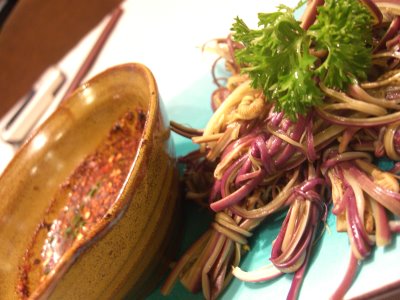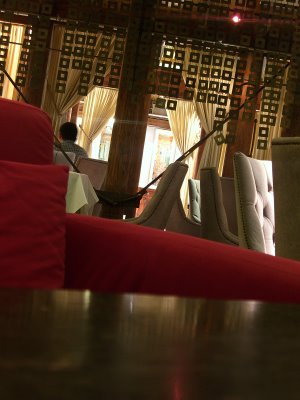Beijing notes aka The Day I Fell in Love with the Little Bastards
They're small and they hate you.
Try to do a Sichuan peppercorn the honour of a gentle chew, a most delicate and respectful exploration of its flavours and texture. Try to celebrate its vibrant colours and heady aroma in hotpots, stir-fries and sauces. Sing its praises through the generations in prose and poetry.
And what does it do in return?
It camouflages itself amongst the food. Peering out from behind a sliver of bamboo shoot, or cackling sinisterly from under a shred of chicken, it bides its time, waiting slowly, furtively and eagerly until the moment arrives. The Big Peppercorn Mobilization Exercise. (If peppercorns watched TV, no doubt the announcement would be broadcast in flashing text across the screen, with team names such as Haha Gotcha!, Look At You Now, and of course the ever popular Little Bastards.)
With phantom stealth, the peppercorn commandos sneak into your mouth. They seek out the deepest, most awkward recesses, count to 3, and then...
You start to feel a bit strange. It's something sour... smoky... tingly.
The feeling spreads. Your mouth gets numb and number. (The prelude to Number and Numberer.) Beads of sweat start to form.
This is not good.
Water doesn't help, nor does tea. You try dislodging the peppercorn, subtly and politely, with a roll of the tongue or a subdued suck. The only result is that you lose all feeling in your tongue and on one side of your mouth. You start to tear. Your brain clouds up and your vision gets blurry.
I repeat: this is not good.
I'm convinced that Sichuan peppercorns are born into a conspiracy against human beings. They want to make us cry. Grown adults, trapped in silent screams and reduced to tears.
Halle Berry's Oscar acceptance speech?
Britney Spears on NBC Dateline?
And, most recently, David Beckham's red eyes on the bench of the England-Portugal match?
All the work of Sichuan peppercorns. (Ok lah, LKY's speech at Singapore's separation from Malaysia, that was real. Don't want no lawsuit there. *eyes shifting from side to side*)
During my two years living in Beijing, there was little I dreaded more than a direct encounter with a Sichuan peppercorn. Hole-in-the-ground toilets I could deal with. Pavement spitting? Wouldn't blink an eye. Lung-clogging sandstorms? Bring it on. But a Sichuan peppercorn? Gimme a one-way ticket back home, please! (Actually that wouldn't work. Those were the pre-credit card days, so the only way to buy a plane ticket would be to hunt down a Bank of China ATM, pray that it worked, then returned every day to withdraw the maximum RMB2000 until you had enough for a ticket, then lug your bag of cash like a Russian mafia goon to a travel agent. By which time the pain would finally have died down and you feel a right wimp. But I digress.)
The funny thing is, ever since I left Beijing, Chinese food never tasted quite as good. There was a complexity missing, a lack of aromatic headiness. Food didn't seem to engage, or tease or seduce in quite the same way. And, you guessed it, I discovered during last week's trip to Beijing that it was quite possibly due to the lack of the dreaded Szechuan peppercorn.
Sichuan peppercorns are, in fact, not peppercorns per se, but dried peppercorn husks. A deep reddish brown, they are employed in liberal quantities due to their ability to impart numbness or "ma", an effect that has been enshrined as one of Sichuan cuisine's five official flavours. The heat and perspiration it generates are also highly sought after for health reasons in both hot and cold weather.
This last trip, I got re-acquainted with the peppercorns first over a dish of gan bian si ji dou or dry stir fried french beans, a staple Beijing dish with Szechuan origins. I then had a chance to experience them in all their splendour when friend and host Amy brought me to Three Guizhou Men's Gongti outlet. Three Guizhou Men opened in Beijing a year or so ago, and its popularity with the young, local crowd soon led to the launch of several additional outlets. The restaurants are casual, but still incredibly chic and stylish - the Gongti outlet I visited is housed in a complex of upmarket clubs and bars (including Coco Banana, the latest offering from Beijing club stalward Club Banana) and boasts sexy contemporary Chinese paintings on each wall. A closer look at the clear ice-like sculpture at the restaurant's entrance yields not just your usual carved phoenixes and plum blossoms, but also cheeky scenes highly unsuitable for young eyes. Tables are filled with young clubbers filling up either before or after a big night out, playing cards and dragging on cigarettes with one hand and loading up on fiery cuisine with the other.

The extensive menu contains a list of Sichuan favourites (Guizhou province is adjacent to Sichuan and received an influx of Sichuan migrants during the Ming dynasty - praise to Wikipedia) as well as many more local dishes that were exotic to me. Most every table was laden with a hotpot dish serving up the restaurant's specialty - suan tang yu or literally sour soup fish - whereby the fish of your choice is served, together with any additionally requested ingredients (such as vegetables, tofu, mushrooms and bamboo shoots), in a scarlet broth of sour tomatoes. The Sichuan peppercorns of course made their appearance, but were sparingly employed to create an appetite whetting ma-ness, as opposed to sheer pain. I'm not usually a big fan of hotpots (Philippe and I actually first met and bonded through our mutual dislike of it), but this was absolutely delicious and practically a meal in itself.

We also ordered a starter of wild vegetables with chili sauce (pictured, also with liberal use of peppercorns), a plate of Guizhou sausages (xiang chang pai gu) which as its Chinese name suggests were more like smoked, spicy ribs de-boned and served as sausages, as well as a cooling plate of sliced pumpkin dressed in syrup. Every dish was wonderful and completely different from anything available in Singapore (at least to my knowledge, I would love to be corrected!) Do give it a try if work or pleasure brings you to Beijing.

Post dinner drinks were at Le Quai, the super stylish haunt of Beijing's glamour crowd. While the food (Chinese with a French influence) is apparently only so-so, the decor is stunning - the bar/restaurant's Qing dynasty interior is the reconstructed home of a nobleman from Jingdezhen city in Jiangxi province. It also hosts one of Beijing's hottest new galleries, the Beijing Art Now Gallery or BANG, on its second floor, and overlooks the lake by Gongti beimen (the north gate of the Workers' Stadium). Le Quai is certainly stunning and probably well-deserved of the title of Beijing's latest hot spot (ooh from hot pot to hot spot, what a witty transition o_O) for leisurely al fresco lunches, sophisticated dining, seductive drinks and even dream weddings.

**********************************************
Three Guizhou Men
8 Gongti Xilu (24 hours)
Tel: +86 10 6551 8517
Other outlets:
6 Guanghua Xilu, +86 10 6502 1733
1-2/F Building 7, Jianwai SOHO, +86 10 5869 0598
Le Quai
Workers' Stadium, across from Gate 12
Tel: +86 10 6551 1636



0 Comments:
Post a Comment
Subscribe to Post Comments [Atom]